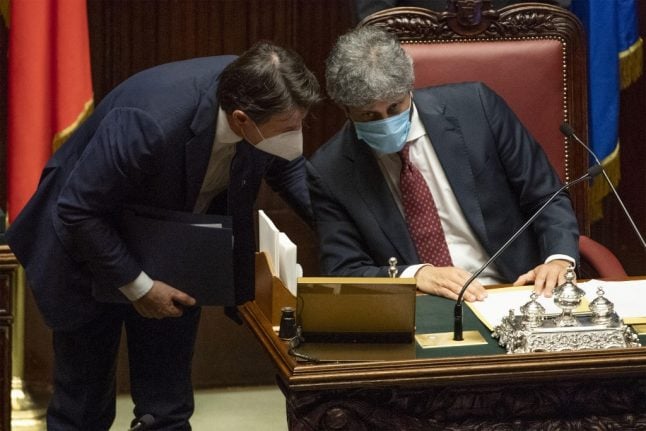POLITICS
What does Italy’s state of emergency mean and why has it been extended?
Italy has extended its state of emergency once again. Here's what that actually means for people in the country.
Published: 8 October 2020 10:51 CEST

Italy's Prime Minister Giuseppe Conte (L) and President of the Italian Chamber of Deputies, Roberto Fico. Photo: AFP
The Italian government has extended the state of emergency until January 21st, 2021, which would mark a year since it was first introduced.
What is the state of emergency?
The most important thing to know is that the state of emergency itself does not determine the emergency rules and restrictions. It’s not the same thing as an emergency decree.
And while it sounds dramatic, the declaration of a state of emergency has a specific purpose.
It gives greater powers to both the national government and to regional authorities, and it was declared in order to allow the Prime Minister to introduce, change, and revoke rules quickly, via emergency decrees, in response to the ever-changing epidemiological situation.
The state of emergency effectively cuts through bureaucracy, as the introduction of these new rules and laws would otherwise require the usual lengthy parliamentary process.
It also allows regional authorities to bring in their own local rules aimed at containing the spread of the virus.
Under the state of emergency, Conte’s government has issued a series of emergency decrees, usually referred to in Italy as DPCM (Decreto del presidente del consiglio, or Prime Minister’s decree) since the outbreak of Covid-19 began.
The decrees have been used to introduce, tighten or relax various rules depending on the current infection rate in Italy and in other countries.
Under the state of emergency it is easier for officials to introduce new health measures and to declare “red zones” in case of outbreaks.
While the coronavirus infection rate in Italy at the moment remains relatively low, it is rising and it the government says it wants to be able to act swiftly if things change.
Will the current rules in Italy change?
The extension of the state of emergency does not automatically mean that rules put in place under the current emergency decree will also be extended.
However the state of emergency is needed to allow the government to pass new rules quickly throug parliament in response to the changing coronavirus situation.
Italy is set to pass its next emergency decree on or before October 15th.
On October 7th, ministers approved a new rule making masks compulsory outdoors at all times of the day, everywhere in Italy.
The mask-wearing rule is backed up with large fines for non-compliance.
Url copied to clipboard!


 Please whitelist us to continue reading.
Please whitelist us to continue reading.
The USA is not mentioned in the update attached here – does anyone know what if Americans are still banned from Italy?
https://www.esteri.it/mae/en/ministero/normativaonline/decreto-iorestoacasa-domande-frequenti/focus-cittadini-italiani-in-rientro-dall-estero-e-cittadini-stranieri-in-italia.html